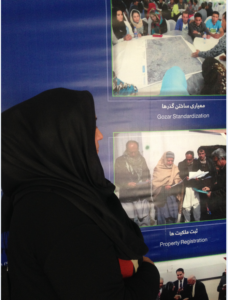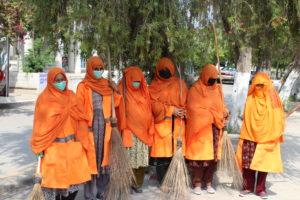Urbanization and Employment
19 June 2018, Kabul. One of the novelties introduced by the New Urban Agenda, the UN roadmap for sustainable urbanization for the next 20 years, is the contribution of urbanization to the prosperity of nations. The transformative nature of urban areas relates to the significant opportunities they offer for both formal and informal employment. Cities contribute to more than 80 percent of the global GDP. However, urban inequality has increased, reducing the capacity of urbanization to promote general well being.
In Afghanistan, unemployment is a major challenge especially for women and youth. The access of women to the labor market has been customarily jeopardized by cultural and social practices. However, through all our projects, UN-Habitat prioritizes on women’s inclusion in the rapid urbanization growth of Afghanistan.
Mrs Fahima Qadirzada works as a social worker in the framework of the City for All Programme (CFA). “If I did not have this job, I would not be able to send my kids to school and university. But equally important is the fact that thanks to this job opportunity, I am developing a professional career working for the people of Afghanistan and with United Nations”, she said.

Mrs. Fahima Qadirzada, a CFA social organizer
City for All is government led programme technically supported by UN-Habitat and funded by the European Union and USAID. CFA is working with the national government, municipalities and local communities to survey urban properties, to develop regulations for registration of urban informal properties, and to produce municipal and district (local) level strategic action plans. CFA is also assisting municipalities to collect municipal services fees. This will increase revenues to fund the implementation of the strategic plans through participatory processes.
The “Clean and Green City Programme” (CGC) is another UN-Habitat technically supported project, funded by the EU and USAID, under the government’s “Jobs for Peace’ initiative”. This ambitious initiative identified several opportunities to improve the economic stability for vulnerable population, especially women, youth and displaced people. Through cleaning activities, collection, segregation and transportation of waste; tree plantation for greenery and public paintings, CGC has created jobs for more than 13500 people in Kabul, Herat, Jalalabad, Bamyan and other major cities.

CGC workers in Jalalabad
For more information, please contact UN-Habitat’s Head of Communications in Afghanistan, Mr. Koussay Boulaich,
